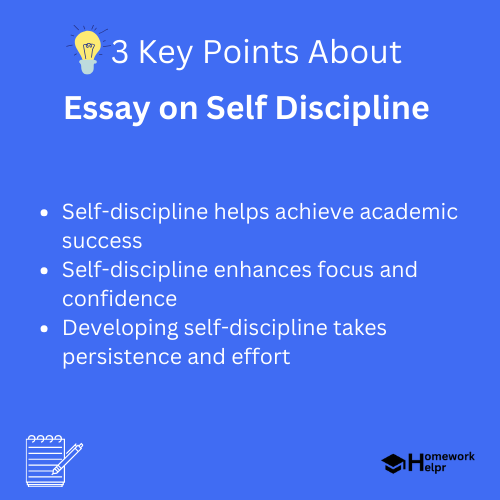📝 Summary
Self-discipline is vital for students and children, enabling them to control their emotions, behaviors, and desires to achieve long-term goals. In a world saturated with distractions, cultivating self-discipline is crucial. It aids in academic success, time management, and personal growth, allowing students to stay focused on their tasks while resisting temptations. Developing this essential quality involves setting clear goals, creating a timetable, and limiting distractions. The benefits of self-discipline extend beyond academics, leading to improved focus, confidence, and better relationships throughout life.
Essay on Self Discipline for Students and Children
Self-discipline is an essential quality that plays a vital role in the lives of students and children. It is the ability to control one’s emotions, behaviors, and desires in order to achieve long-term goals. Having strong self-discipline means that a student can stay focused on their studies, resist distractions, and work consistently towards achieving their academic objectives.
In our fast-paced world, where countless distractions surround us, it becomes even more important to cultivate self-discipline. This essay will explain what self-discipline is, its importance, ways to develop it, and the benefits it offers to students.
What is Self Discipline?
Self-discipline can be defined as the practice of training oneself to improve self-control, foster willpower, and diminish impulsive urges. It helps individuals choose the right path in circumstances where temptation looms large. By being self-disciplined, one can resist short-term pleasures for the sake of achieving more significant, long-term rewards.
Definition
Self-Control: The ability to regulate emotions and behaviors in the face of temptation.
Willpower: The strength of will to carry out one’s decisions and control impulses.
Importance of Self Discipline
Self-discipline is crucial for students for several reasons:
- Achievement of Goals: Self-discipline empowers students to set clear goals and work persistently towards them.
- Academic Success: Students with strong self-discipline are more likely to excel in their studies, leading to better grades and academic achievements.
- Time Management: It helps children manage their time effectively, allowing them to balance studies, chores, and leisure activities.
For students, acquiring self-discipline is not just beneficial in academics; it also extends into personal and professional realms in the future. Establishing this quality early on sets the foundation for success in various walks of life.
Ways to Develop Self Discipline
Developing self-discipline is a gradual process that requires persistence and effort. Here are some effective strategies that students can implement:
- Set Clear Goals: Break down larger tasks into smaller, manageable goals. This approach provides clarity and better direction.
- Create Timetable: Organizing a study schedule helps students set dedicated time slots for studying, exercising, and leisure.
- Limit Distractions: Identify and reduce anything that distracts you from your goals. This might include turning off notifications or creating a quiet study environment.
Examples
If a student aims to improve their grades, they can create a timetable dedicating specific hours for each subject and ensure they stick to it, minimizing distractions from phones or television during study sessions.
Moreover, nurturing self-discipline involves practicing mindfulness. This allows individuals to become aware of their thoughts and emotions, helping them make better choices.

Benefits of Self Discipline
The benefits of self-discipline extend far beyond improved grades. Here are some of the key advantages:
- Improved Focus: Students with self-discipline can concentrate better, which enhances their ability to learn and understand concepts.
- Confidence: Mastering self-discipline leads to increased self-esteem as students see their capabilities to achieve what they set out to do.
- Better Relationships: Self-discipline enhances social skills by teaching students to communicate effectively and manage conflicts.
❓Did You Know?
Did you know that practicing self-discipline can actually rewire your brain? Consistent self-control improves decision-making skills and helps you become better at managing emotions!
In addition to these advantages, self-discipline is foundational for building resilience. Students who develop this quality tend to approach challenges with a positive mindset and the determination to overcome obstacles.
Conclusion
In summary, self-discipline is a powerful tool that can lead students and children towards a successful and fulfilling life. It enables them to set goals effectively, manage time wisely, and resist distractions. Developing self-discipline takes time, but the effort is undoubtedly worth it. By practicing strategies like goal-setting, creating schedules, and limiting distractions, students can cultivate this invaluable skill. As they grow, this quality will not only help them excel academically but will also prepare them for the challenges of life ahead.
In the journey of education and beyond, self-discipline will always be a key ingredient for success!
Related Questions on Essay on Self Discipline for Students and Children
What is self-discipline?
Answer: Self-discipline is the ability to control emotions and behaviors.
Why is self-discipline important for students?
Answer: It empowers students to achieve academic and personal goals.
How can students develop self-discipline?
Answer: By setting goals, creating timetables, and limiting distractions.
What are the benefits of self-discipline?
Answer: Improved focus, confidence, and better relationships.
